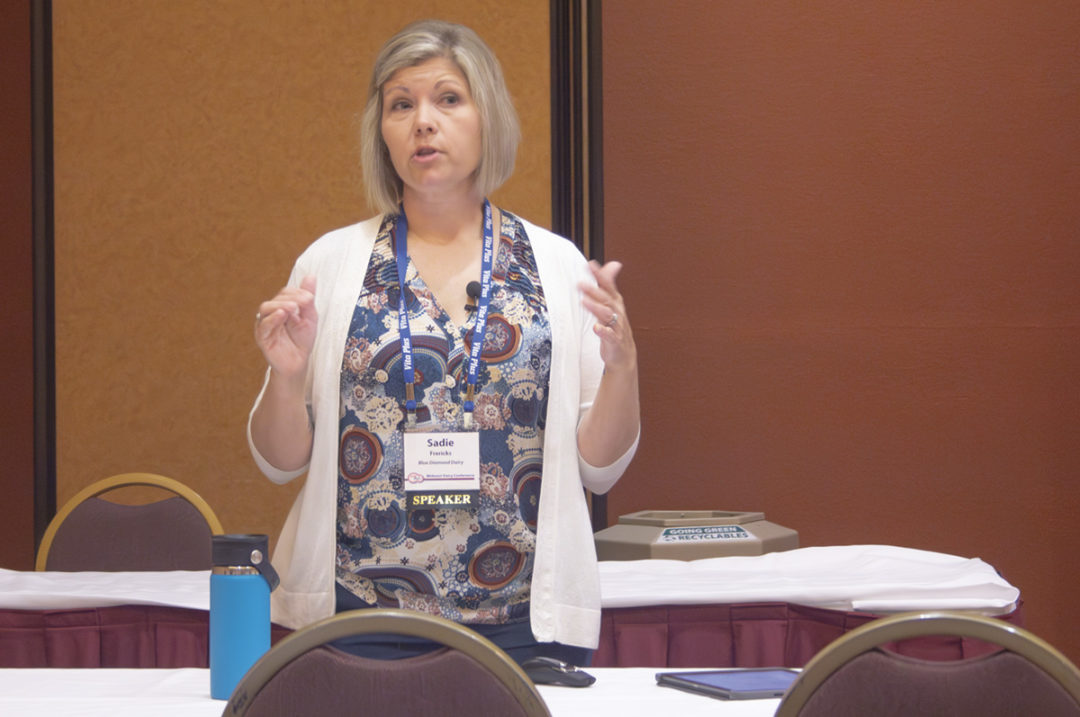Political advocacy has never been more relevant for the future of farming than in today’s climate. Not only are dairy producers faced with the growing pressure to influence consumers for the social right to farm, they too must engage with lawmakers on every level to ensure there is a license to farm.
“As farmers, we focus on what’s managed on our side of the mailbox, and day to day it can be hard keeping up with what’s going on in your township, at the state capitol and in Washington (D.C.),” Frericks said. “But, influencing policy and getting involved is so important to our dairy community. Both our social license and literal license to farm are impacted by policymakers and they have a lot to say in what happens on our farms.”
Frericks and her family operate a first-generation farm in Minnesota, while Frericks has the pedigree of a sixth-generation farmer. She spoke of the impact dairy producers and industry allies can have on policy, both on and off the farm, during the Vita Plus Midwest Dairy Conference June 14.
There are five ways Frericks said anyone can get involved with policy and effectively influence lawmakers’ decisions for the betterment of the industry. While each tactic is unique and effectual in its own way, the underlying themes are the same – to tell a story, build relationships and connect to an issue.
“We have to help (lawmakers) connect the dots, and then offer a basic explanation of how this affects your farm,” Frericks said. “Always come back to this statement, ‘What it comes down to is dairy farms are good for America and this is why …’”
Much like influencing consumers’ thoughts on dairy, influencing policy is simply building or enriching relationships and telling your dairy story.
“Lawmakers hold their positions for many years,” Frericks said. “We want to be their number one source when they have a question.”
Frericks first lobbied at the capitol when she was in high school. She is currently serving on the Minnesota Milk Producers’ Association board of directors and the corporate board for Land O’Lakes – both of which allow her to routinely express the industry’s top priorities with lawmakers.
She used the example of a drought relief package that was developed in Minnesota following the 2021 dry growing season, and the story she told one lawmaker that was heard all throughout the capitol.
“That year, we were only able to harvest 25 percent of our corn silage and had to purchase beet pulp as a supplement to keep our farm going,” Frericks said. “I told that story to my representative when we were at an event together. Fast-forward six months and that story was retold another 25 times. Find stories that connect to an issue affecting our farms and lawmakers will retell it over and over again to represent their constituents in the lawmaking process.”
So how can one get involved?
1. Join a state dairy trade association
Every state has a dairy trade association whose sole purpose is for political advocacy. Not only are dairy producers encouraged to participate in these organizations, but there is often membership available for industry partners as well.
Likewise, Frericks recommended cooperatives take part in the national organizations.
“These trade associations have lobbyists who keep an eye on what comes down the regulation pipeline,” Frericks said. “We can’t all be watching to know what’s happening all the time. These lobbyists and government affairs teams monitor what’s happening and share updates with members. It’s a great way to be involved and influence policy.”
In addition to lobbyists, trade associations often host lobby days to build in-person relationships with lawmakers and use political action committee (PAC) funding to support lawmakers’ stay in office or get elected.
2. Use digital means to communicate with lawmakers
A simple way dairy producers can connect with lawmakers is through digital communications. Frericks said this may look like sending an email introducing themselves as a constituent, following a representative on social media and commenting on issues or participating in action-email campaigns when necessary.
Frericks’ state dairy trade association sends out action alerts for policies that need support or disapproval. Members follow a prompt to send an email to their representatives with the important message generated from the trade association.
“They need constituent voices and to share those on one side or another of an issue,” Frericks said. “That’s a way to take action and influence policy when needed and not be so involved all the time.”
3. Influence with on-farm events
One of the best ways to influence policy and build stories representative of the issues lawmakers are voting on is to invite them out to the farm. Frericks stressed that this step can only happen successfully once a relationship with lawmakers is established.
“Make sure you’re inviting congressmen on the state and federal level to interact with farmers,” Frericks said.
These invitations should not be constrained to farms but also include area events focused on the dairy industry.
4. Get involved with county or township boards
Local non-dairy organizations also influence policy that affect the dairy industry.
Frericks suggested getting involved with these organizations, such as the area watershed or township. Involvement can be as simple as attending meetings and making a presence known, or even serving on those boards in a leadership position.
“Getting involved with the county or township is a low-effort way to work on relationships with people who influence policy,” Frericks said. “Invite them to the county fair, they’re likely attending anyways, and show them around; talk to them about what’s going on in agriculture.”
5. Attend legislative events that support the dairy industry
Whether at the state capitol, state fair or lobbying events in a congressmen’s district, there are vast opportunities for dairy producers and industry allies to connect with lawmakers and share their personal dairy story.
“These are great ways to lobby for dairy,” Frericks said. “Even if the event or location isn’t representative of what’s going on at home, they’re an opportunity to have a conversation.”
Frericks stressed that oftentimes staff members will attend these events rather than the lawmakers themselves. Despite a different face, constituents should not alter their talking points when speaking with lawmakers or their staff.
“At the federal level, there are a lot of times you’ll meet with a representative’s staff,” Frericks said. “Lawmakers heavily rely on their staff to keep them up to speed. Those young staff members are influencing the decisions your lawmaker makes.”
These five approaches are ways those in the dairy industry can influence policy, and each is important in ensuring a license to farm for today’s producers and future generations.
“It’s OK to feel nervous; it’s OK to feel ineffective when you first begin,” Frericks said. “Connecting with your lawmaker is like riding a bike. You start to feel more confident and competent the more you do it, and you build on experience each time you go.”





